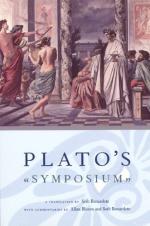
|
| Name: _________________________ | Period: ___________________ |
This test consists of 15 multiple choice questions and 5 short answer questions.
Multiple Choice Questions
1. What kind of literature does Agathon thank love for inspiring?
(a) Myths.
(b) Poetry.
(c) Tragedies.
(d) Plays.
2. As explained by Socrates, which images can the young philosopher understand and reproduce?
(a) Virtue, beauty, and wisdom.
(b) Virtue and wisdom, but not beauty.
(c) Beauty and wisdom, but not virtue.
(d) Virtue and beauty, but not wisdom.
3. According to Alcibiades, what tactic does not work with Socrates?
(a) Flattery.
(b) Bribery.
(c) Manipulation.
(d) Fear.
4. What does Diotima tell Socrates about Love's function?
(a) It allows humans to taste immortality.
(b) It allows the ignorant to feel wise.
(c) It allows humans to understand immortality.
(d) It allows the wise to feel ignorant.
5. How does Alcibiades claim that Socrates assaulted him?
(a) He does not claim that Socrates assaulted him.
(b) Verbally.
(c) Physically.
(d) Mentally.
6. How does Diotima think a young person should interact with beautiful minds?
(a) Only gain knowledge from them.
(b) Only give ideas to them.
(c) Exchange knowledge and ideas with them.
(d) Neither gain knowledge nor give ideas to them.
7. How does Agathon compare love with other desires?
(a) It is one of the weakest desires.
(b) It is the weakest desire.
(c) It is one of the strongest desires.
(d) It is the strongest desire.
8. According to Agathon, what effect does love have on bad things?
(a) It increases them.
(b) It has very little effect on them.
(c) It has no effect on them.
(d) It removes them.
9. What reason does Socrates give for why people fight in wars?
(a) They are really fighting a war within themselves.
(b) They consider the enemy to be evil.
(c) They believe in the causes they fight for.
(d) They think their names will live on.
10. According to Alcibiades, what type of music are Socrates' speeches comparable to?
(a) A string quartet.
(b) Tribal drums.
(c) Flute playing.
(d) Piano waltzes.
11. What general definition of Love does Diotima provide?
(a) The desire to have the good forever.
(b) The desire to have the bad temporarily.
(c) The desire to have neither good nor bad.
(d) The desire to have both good or bad.
12. Which one of the following is not included in Diotima's list of things that spirits help with?
(a) Reason.
(b) Fortune telling.
(c) Dreams.
(d) Prayers.
13. In Socrates' speech, how does he describe someone who searches for wisdom?
(a) Ignorant.
(b) In between wise and ignorant.
(c) Wise.
(d) Neither wise nor ignorant.
14. Why does Diotima think Love is not a god?
(a) Love cannot make laws.
(b) Love cannot understand the language of the Gods.
(c) Love cannot create things.
(d) Love can die quickly.
15. In Agathon's opinion, what does love compel people to do?
(a) Mostly the right thing, but sometimes the wrong thing.
(b) The wrong thing.
(c) The right thing.
(d) Mostly the wrong thing, but sometimes the right thing.
Short Answer Questions
1. According to Diotima, who is Love's mother?
2. According to Socrates, which love helps a philosopher reproduce an idea?
3. What example does Socrates use as a tale that has lived throughout generations?
4. According to Socrates, what ideas can a man become "pregnant" with?
5. Who does Alcibiades request to listen to the story of his extreme actions with Socrates?
|
This section contains 541 words (approx. 2 pages at 300 words per page) |

|




